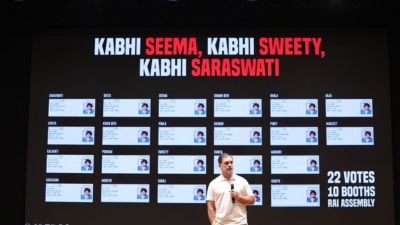‘Without panchayats, people would have been protesting’: As uncertainty looms over local polls, Kashmir sarpanches have a warning
Calling for panchayat polls at the earliest, sarpanches of several villages told The Indian Express that a system had evolved in which panchayats were performing efficiently to deal with local issues.
 A security official stands guard during the celebration of the 75th Republic Day, in Srinagar, Friday, Jan. 26, 2024. (PTI)
A security official stands guard during the celebration of the 75th Republic Day, in Srinagar, Friday, Jan. 26, 2024. (PTI)With the tenure of panchayats in Jammu and Kashmir coming to an end earlier this month, and no announcement on fresh elections, sarpanches of several villages have raised concerns on the “vacuum” that could be created by a lack of local elected leadership that residents find approachable.
Calling for panchayat polls at the earliest, sarpanches of several villages told The Indian Express that a system had evolved in which panchayats were performing efficiently to deal with local issues.
“I was able to get a lot of work done with the funds we were getting. We prioritised flood control in our area that had been pending for a long time. We also put new transformers in place,” said Qayoom Mir, who was sarpanch of Pohu in South Kashmir.
Even now, after the five-year tenure of 4,892 elected panchayats ended on January 9, people come to his residence with their issues, he said, pointing out that panchayats were able to provide the most focused attention to grassroots concerns.
“If there were no panchayats over the last five years, people would have been protesting against lack of representation,” the 50-year-old said.
Sarpanches had access to funds of Rs 23.30 lakh annually, apart from funds for centrally sponsored schemes and capital expenditure for different works. They worked with different departments to prioritise village-level work and rural infrastructure.
With District Development Councils (DDCs) being the sole tier of elected governance now left in Jammu and Kashmir, the vacuum of grassroots democracy has come into greater focus.
In November last year, the term of urban local bodies, including two municipal corporations, 19 municipal councils and 57 municipal committees had ended.
According to sources in the government, elections to urban local bodies and panchayats are unlikely before the Lok Sabha elections.
Further, elections to the Jammu and Kashmir Assembly need not be held along with the Lok Sabha polls, the sources said, citing the deadline of September 2024 given by the Supreme Court while delivering its judgement on the constitutional validity of the J&K Reorganisation Act, 2019. The last Assembly elections in J&K were held in 2014.
On January 10, the J&K administration appointed Block Development Officers (BDOs) as administrators to run the affairs of panchayat halqas (area comprising a village or villages) under their jurisdiction for a period of six months. Officials of the Rural Development Department will overtake work under centrally sponsored schemes until fresh elections are announced.
However, according to Ajaz Ahmad Mir, sarpanch of Galbuk in North Kashmir, such officials will not be able to match the knowledge that sarpanches would have about their panchayats. “Officials work in larger areas with several villages under them. The way I am available to my people, officials cannot afford them the same attention,” he said.
Over the last three years, Mir said, the panchayat was able to spend Rs 1 crore on development work. “There is a vacuum on the ground. Although officials will work now that our tenure is over, I feel that they will not know the issues of every village and every area the way we do,” he said.
Sheikh Suhail, sarpanch in Payer, South Kashmir, said he had prioritised work on irrigation canals in his area and ensured full utilisation of funds. “We also made a public health centre in our panchayat halqa because that was a longstanding demand in this area,” he said.
“Having elected representatives brings accountability within the system. Officials have many responsibilities, and the people need representatives that can take charge like we did,” he added.







